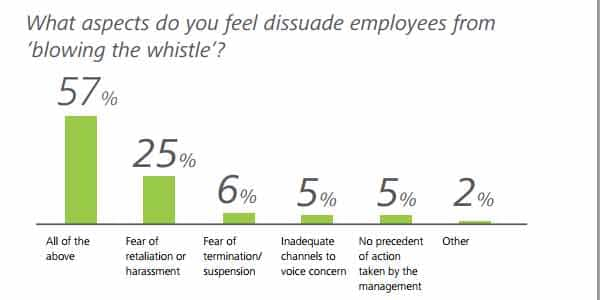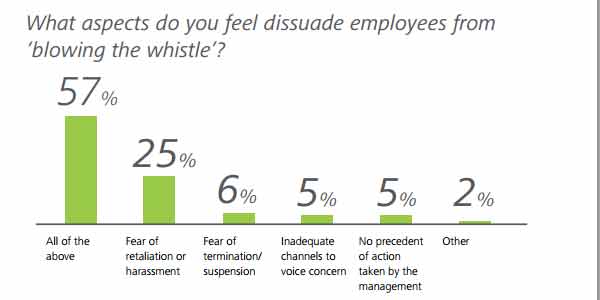Whistleblowing in the corporate world has never been easy with most employees fearing reprisal for their actions and preferring to stay mum over transgressions. The latest case of Anirban Dey , former SAP India, who complained about an alleged assault by a colleague only to be slapped with a police case that resulted in him leaving the firm only highlights the importance of a whistleblower policy in the corporate world.
A new survey has found that for most employees of India Inc, being able to retain anonymity and a easy way to complain can be enough for an employee to bring a fraud to the notice of the management.
According to a report by Deloitte titled ‘Lead by example: Making whistleblowing programs successful in corporate India’, one of the major reasons for employees of firms prefer not to report fraud is because of the fear of repercussions due to lack of anonymity.
The survey found that 90 percent of the respondentsagreed that just the setting up of a whistleblower hotline could help reduce fraud, and 68 percent of the respondents said their companies were actually equipped with a hotline or a policy on how to protect whistleblowers.
Despite many corporate houses now having facilities to report fraud and policy in place, it turns out most employees aren’t convinced about its effectiveness just yet.
The survey respondents indicated a number of reasons for employees to not feel confident using their companies’ whistleblower hotline such as fear of retaliation or harassment, fear of termination/ suspension, inadequate channels to voice concern, no precedent of action taken by the management and other reasons. But for a majority of them, all the reasons hold true and dissuade them from alerting the company.
[caption id=“attachment_88790” align=“aligncenter” width=“600”]
 Image: Deloitte report[/caption]
Image: Deloitte report[/caption]
For most employees the policy for whistleblowers has to ensure anonymity but it should also have a independent redressal mechanism and should ensure protection for the whistleblower.
[caption id=“attachment_88794” align=“alignleft” width=“600”]
 Image: Deloitte report[/caption]
Image: Deloitte report[/caption]
Whistleblowing could involve several forms of communication, such as the use of a special telephone hotline, e-mail, web form, regular mail, fax or at times simply speaking up to a supervisor/ manager, human resources specialist, or a trusted person.While most respondents preferred to be able to complain on various platforms; the single most popular preferrence was to have an e-mail based service.
[caption id=“attachment_88792” align=“aligncenter” width=“600”]
 Image: Deloitte report[/caption]
Image: Deloitte report[/caption]
)